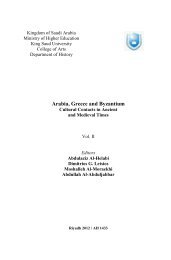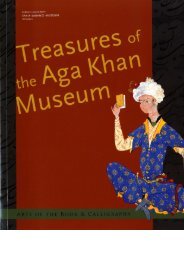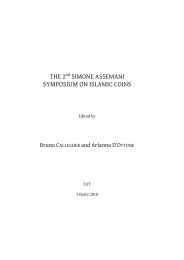ulum-al-quran
ulum-al-quran
ulum-al-quran
You also want an ePaper? Increase the reach of your titles
YUMPU automatically turns print PDFs into web optimized ePapers that Google loves.
Sura <strong>al</strong>-ikhlas (112) firstly responds to the mushrikun in Makka before the hijra, and secondly to the ahl <strong>al</strong>-kitab<br />
encountered in Madina after the hijra. [Itqan, I, p.35; Wahidi, op.cit., pp.262-3.]<br />
Another example is Sura 9: 113:<br />
This aya was reve<strong>al</strong>ed firstly in connection with the death of the Prophet's uncle Abu T<strong>al</strong>ib, where<br />
Muhammad said 'I will keep on asking (Allah for) forgiveness for you unless I am forbidden to do so'.<br />
Then there was reve<strong>al</strong>ed: it is not fitting for the Prophet and those who believe that they should<br />
pray for forgiveness for pagans, even though they be of kin, after it has become clear to<br />
them that they are the companions of the Fire. [Bukhari, VI, No. 197.]<br />
The other occasion reported is when the Companions and in particular 'Umar b. <strong>al</strong>-Khattab found the Prophet shedding<br />
tears when he visited the graveyard. The Prophet explained that he had visited his mother's grave and that he had asked<br />
his Lord's permission to visit it which had been granted to him and that he had <strong>al</strong>so asked his Lord's permission to pray<br />
for her forgiveness which had not been granted to him and the above aya had been reve<strong>al</strong>ed. [Wahidi, op. cit., p. 152.]<br />
Sever<strong>al</strong> Revelations and One Sabab<br />
A well-known example for sever<strong>al</strong> revelations, which are connected with one particular circumstance, are three verses<br />
which according to reliable reports, came down in response to the question of Umm S<strong>al</strong>ama, whether or why only the<br />
men had been referred to in the Qur'an, as being rewarded. According to Al-Hakim and Tirmidhi the verses 3:195, 4: 32<br />
and 33:35 were reve<strong>al</strong>ed in response to this question:<br />
'And their Lord has accepted of them and answered them: Never will I suffer to be lost the<br />
work of any of you be he m<strong>al</strong>e or fem<strong>al</strong>e: Ye are members, one of another: those who have<br />
left their homes, or have been driven out therefrom, or suffered harm in My cause, or fought<br />
or been slain - verily I will blot out from them their iniquities and admit them into gardens<br />
with rivers flowing beneath; a reward from the presence of God and from His presence is the<br />
best of rewards' (3: 195).<br />
'And in no wise covet those things in which God has bestowed His gifts more freely on some<br />
of you than on others; to men is <strong>al</strong>lotted what they earn and to women what they earn: but<br />
ask God of His bounty for God has full knowledge of <strong>al</strong>l things' (4: 32).<br />
'For Muslim men and women - for believing men and women - for devout men and women,<br />
for true men and women, for men and women who are patient and constant, for men and<br />
women who humble themselves, for men and women who give in charity, for men and<br />
women who fast, for men and women who guard their chastity, and for men and women<br />
who engage much in God's praise - for them has God prepared forgiveness and great reward'<br />
(33:35). [S<strong>al</strong>ih, op cit., p. 148]<br />
Sever<strong>al</strong> Views on Sabab <strong>al</strong>-Nuzul<br />
It <strong>al</strong>so occurs that the Companions of the Prophet when mentioning a revelation, differed in their views about its sabab<br />
<strong>al</strong>-nuzul. This is due to the fact that as <strong>al</strong>ready shown above there have been various asbab for one particular revelation,<br />
and each of the persons reporting the circumstances had been present only on one of the various occasions.<br />
Otherwise sever<strong>al</strong> views about the same revelation have to be judged on their merits according to the rules of '<strong>ulum</strong> <strong>al</strong>-<br />
,hadith, and one of them will be found to be stronger than the others.<br />
There are two reports concerning the revelation of Sura 17: 85:<br />
According to Ibn 'Abbas, as reported in Tirmidhi, the Quraish asked the Jews to give them something<br />
they could ask the Prophet about and they were advised to ask about the Spirit (<strong>al</strong>-ruh). Then the aya<br />
17:85 was reve<strong>al</strong>ed.<br />
From Ibn Mas'ud, as reported in Bukhari, it is related that he said: While I was in the company of the<br />
Prophet on a farm, and he was reclining on a p<strong>al</strong>m leaf st<strong>al</strong>k, some Jews passed by. Some of them said<br />
to the others: Ask him about the Spirit. Some of them said: What urges you to ask him about it. Others<br />
said: (Don't) lest he should give you a reply which you dislike, but they said, Ask him. So they asked him<br />
about the Spirit. The Prophet kept quiet and did not give them any answer. I knew that he was being<br />
divinely inspired so I stayed at my place. When the divine inspiration had been reve<strong>al</strong>ed, the Prophet said





